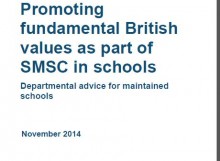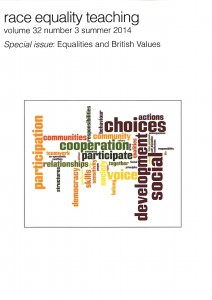Educationalists Bill Bolloten and Robin Richardson discuss the impacts of the ‘fundamental British values’ (FBV) agenda.
The time is late January 2015. The place is a university campus somewhere in England. ‘Kill Islam,’ says a piece of graffiti scrawled in big red letters on one of the university’s buildings, ‘before it kills you’. ‘How do I feel?’ a Muslim student asks himself when seeing this. ‘A little shocked,’ he replies. ‘I wasn’t expecting it. A little upset, that was expected. A part of me just shrugged.’
He continues: ‘The initial reaction is to ignore it, or to pretend you’re ignoring it. That you’re desensitised: it doesn’t matter, it happens all the time. It’s normal now. But then you can’t ignore it, because it’s all around you. Every time you come back onto campus, you’re reminded of it. When you’re trying to focus, it’s that nagging thought in the back of your head that keeps coming back. And there’s the constant question that you ask yourself: do I belong here? I thought the days of the ’70s when our grandparents were harassed and hounded on the streets by screaming skinheads were long gone. On campus, where I’m supposed to feel safe, there are people who actively call for the killing of people like me. I came to university to get an education, not to be the object of vitriolic hate.’
‘Abide by our values’
 There is increasing anxiety and insecurity amongst many British Muslims at present, an increasing feeling that they do not belong here, do not even belong in the places where they should feel most safe, the country’s universities, colleges, schools and nurseries. Such feelings have been exacerbated by the actions of government, and by government inspection and accountability regimes such as Ofsted and the Education Funding Agency. The recent requirement for all schools to actively promote what the government calls fundamental British values (FBV) is playing a particularly insidious and damaging role. This article discusses the extraordinarily clumsy and damaging way the government, with zealous assistance from Ofsted, has introduced the FBV agenda. It touches also on sinister aspects of Theresa May’s counter-terrorism and security bill, which completed its passage through parliament last week.
There is increasing anxiety and insecurity amongst many British Muslims at present, an increasing feeling that they do not belong here, do not even belong in the places where they should feel most safe, the country’s universities, colleges, schools and nurseries. Such feelings have been exacerbated by the actions of government, and by government inspection and accountability regimes such as Ofsted and the Education Funding Agency. The recent requirement for all schools to actively promote what the government calls fundamental British values (FBV) is playing a particularly insidious and damaging role. This article discusses the extraordinarily clumsy and damaging way the government, with zealous assistance from Ofsted, has introduced the FBV agenda. It touches also on sinister aspects of Theresa May’s counter-terrorism and security bill, which completed its passage through parliament last week.
The education secretary Nicky Morgan wasted no time in using the attack on Charlie Hebdo in Paris to emphasise the requirement to teach British values in England: ‘We’ve seen what can happen last week when people don’t appear to respect some of those values, things like tolerance and mutual respect. In the light of recent events … It’s very, very important.’
Nigel Farage chimed in with similar views, though expressed more colourfully. The attack on Charlie Hebdo, he said, was the result of Islam having a fifth column living in Western countries opposed to Western values – ’We’ve got people living in these countries, holding our passports, who hate us.’ ‘Luckily,’ he added, ‘their numbers are very, very small but it does make one question the whole really gross attempt at encouraged division within society that we have had in the past few decades in the name of multiculturalism.’
Even the monarchy has got in on the act: ‘CHARLES TO UK MUSLIMS’, said the banner headline across the front of the Mail on Sunday last week, ‘ABIDE BY OUR VALUES’. In what was described by the paper as a ‘tough stance on Islamic extremism’, the future king referred to British values and said ‘you would think the people who have come here, or are born here, and go to school here, would abide by those values and outlooks’.
Parochial, patronising and arrogant
The requirement to promote FBV has been met by criticism, exasperation, derision and bewilderment. The list of values was seen as vacuous nonsense in the Daily Telegraph, and as parochial, patronising and arrogant and meaningless at best, dangerous at worst and a perversion of British history in any case in the Guardian.
If these are British values, said a philosopher of education, I’m a Dutchman. ‘Islam is reviving British values … The setting-up of British values against any kind of values, whether Muslim or Christian, just won’t do,’ said the former Archbishop of Canterbury.
‘The issue of great concern for most Muslim communities,’ wrote a Muslim observer, ‘is not that they see a conflict between Muslim values and British values but that their children are growing up in a society in which such an imaginary binary opposition is constantly propagated by both politicians and extremist elements within their communities’.
The focus on FBV, said Gus John, is ‘grooming untold numbers of resentful, angry, embittered and radicalised young Muslims, men and women, and they need not have been anywhere near a Muslim “extremist”. It is ironic that education secretaries and the rest talk about teaching history and demand that a certain corpus of historical works is taught in schools, but they appear to have no capacity whatsoever to learn from history.’
In addition to these criticisms, there is growing apprehension in schools since Ofsted inspectors appear to be pursuing FBV very zealously indeed, and in consequence to be harshly judging certain schools to be failures. Her Majesty’s Chief Inspector of Schools, Sir Michael Wilshaw, recently told a House of Commons select committee that ‘inspecting how British values are taught is one of the most important things we are doing at the moment’.
Background
Much of the comment about FBV seems to assume the term itself was coined in the wake of the Trojan Horse affair and its use is essentially educational. Certainly the Trojan Horse affair, arising from a malicious and Islamophobic forgery, provided a convenient peg on which the government could hang its FBV policies. But in point of fact the term FBV w as coined in 2011 and the original context had nothing directly to do with education, for it occurred within a so-called definition of extremism in the appendix of a document reviewing the Prevent counter-terrorism strategies issued by the Home Office.
as coined in 2011 and the original context had nothing directly to do with education, for it occurred within a so-called definition of extremism in the appendix of a document reviewing the Prevent counter-terrorism strategies issued by the Home Office.
The purpose of the definition was to explain how the Home Office would decide in future whether or not to talk to, work with and fund certain organisations and individuals, particularly in its relationships with Muslim groups and communities. It reflected the superficially attractive but essentially faulty theory underlying the government’s counter-terrorism programme, namely that the root cause of terrorist acts perpetrated by people of Muslim heritage is the ideology or narrative known as Islamism. As Arun Kundnani has recently shown, the theory is simplistic, unsupported by evidence and counter-productive, and is not at all a sound basis on which to build and teach concepts of British values.
Martin Innes, director of the Universities’ Police Science Institute at Cardiff University has argued that FBV was made a focus for the work of schools as a result of the review of the Prevent strategy commissioned by the Coalition government in 2010. This sought to re-orientate it to have less emphasis on and investment in ‘grassroots’ community-based interventions, and a greater role for statutory agencies, such as schools, in tackling extremism, identifying individuals at risk of radicalisation and delivering interventions to mitigate these risks. It is most improbable, however, that moving counter-terrorism work upstream into schools, and thus putting teachers into the frontline of such work and requiring Ofsted to inspect how they do this, will be even relevant, let alone effective.
However the dubious list of British values taken from the Prevent programme has since become embedded in education. New teachers’ standards, introduced for use in schools in England from September 2012, requires teachers to uphold public trust by ‘not undermining fundamental British Values’.
 In June 2014, the then secretary of state for education, Michael Gove, announced to the House of Commons, as part of his comments on the Trojan Horse affair in Birmingham, that all schools would be required to actively promote FBV and that this would be enforced through changes to the Ofsted inspection framework.
In June 2014, the then secretary of state for education, Michael Gove, announced to the House of Commons, as part of his comments on the Trojan Horse affair in Birmingham, that all schools would be required to actively promote FBV and that this would be enforced through changes to the Ofsted inspection framework.
Then in September 2014 FBV appeared in revised standards for pupils’ spiritual, moral, social and cultural development for academies, free schools and independent schools. In November new non-statutory advice from the DfE was published for maintained schools. Concurrently Ofsted revised its inspection handbook so that this now states that a school may be judged inadequate if ‘there are serious weaknesses in the overall promotion of pupils’ spiritual, moral, social and cultural development or their physical well-being, so that pupils are intolerant of others and/or reject any of the core values fundamental to life in modern Britain’.
Contemplating Ofsted’s behaviour in recent months a former HMI remarks that ‘in the light of the Trojan Horse affair Ofsted finds itself the arbiter of what constitutes extremism in schools – without any thought-through consensus on the “fundamental values” threatened by extremism or on the propriety of investing this responsibility to an organisation whose inspectors are not trained … to undertake the task … The current situation is fraught with danger to community cohesion, cultural identity, school success – and also to Ofsted’s raison d’etre. To borrow religious vocabulary, Ofsted has got itself, and faith schools more generally, into an unholy mess as it trespasses on ground where any sensible angel (of whatever religious complexion) would fear to tread.’
The chief education officer of the Church of England Board of Education is similarly critical of Ofsted’s approach. ‘The experience of recent inspections,’ he writes, ‘suggests that Ofsted is increasingly being required to make nuanced judgements about aspects of school life where there are few, if any, guidelines. This is an unreasonable expectation to place on the inspectors and is ultimately unfair on the schools and their pupils if we haven’t beforehand made clear what they are looking for. Without a major rethink, the credibility of Ofsted’s judgements will be quickly undermined and we will lose a valuable asset for the sector. Whilst Ofsted works out how it measures ‘British Values’ and schools wonder how they might be downgraded for failing to promote them, asking Ofsted to become the schoolroom security service is a step too far. As a country we have access both to counter terrorism experts and to educational professionals. Suggesting these groups swap roles in an attempt to build a safer society needs more thought.’
The Counter-Terrorism and Security Bill
In December the government published a consultation on ‘guidance for specified authorities on the duty to have due regard to the need to prevent people from being drawn into terrorism.’ The counter-terrorism and security bill seeks to place a duty on specified authorities to have regard for guidance issued by the secretary of state.
The guidance states that universities ‘must take seriously their responsibility to exclude those promoting extremist views that support or are conducive to terrorism’, and that policies and procedures on speakers and events should include ‘sufficient notice of booking (generally at least fourteen days) to allow for checks to be made and cancellation to take place if necessary, and advance notice of the content of the event, including an outline of the topics to be discussed and sight of any presentations, footage to be broadcast etc’.
The guidance set out similar expectations and requirements for schools, including nursery schools, early years childcare providers, and holiday schemes for disabled children. These include risk assessments on pupils, staff training on extremism and identifying children at risk of being drawn into terrorism, and ensuring FBV is promoted through the curriculum.
In a section on monitoring and enforcement, the guidance restates the role of Ofsted in assessing the effectiveness of a school’s approach to keeping pupils safe from the risk of radicalisation and extremism.
Frances Webber notes that the wording in the counter-terrorism bill is ‘extraordinarily vague’ about what schools and universities should actually do and not do and comments that ‘the draft guidance proposed by the minister to flesh it out imposes a vast array of component duties, which will require Stasi-like networks of surveillance and bureaucracy’. Even a cursory reading of the workings of this bill, writes Karma Nabulsi demonstrates that it … ‘is against British values. It goes against the very meaning of democracy. It is completely against the rule of law and individual liberty. It flies in the face of mutual respect and tolerance.’ She adds that the bill ‘represents the rise of ideological extremism masquerading as British values. Every citizen needs to become informed about what this legislation will do, and how profoundly it affects them. Directed against Britain’s cherished freedoms and its citizens, the bill itself is an extremist act.’
Consequences
In summary, the way the government is introducing FBV is likely to have the following consequences:
- a) Mutual trust and positive relationships between schools and their local Muslim communities, already pressured and stigmatised by the Trojan Horse affair based on a malicious forgery, will be further damaged by heightened levels of surveillance.
- b) There will superficial, reductive and meaningless activity focused on FBV in many schools, driven by fear of Ofsted and the desire to tick a ‘British values’ box.
- c) Attention will be focused away from much-needed work that develops pupils’ independent and critical thinking, and that challenges prejudice, discrimination and bullying related to race, religion and culture.
Further, the government’s FBV agenda is likely be counter-productive, with more young people not fewer feeling alienated and marginalised by mainstream British society, including even its educational system from nurseries and childminders to colleges and universities, and in consequence suspicious, critical and challenging towards what the government claims are fundamental British values.
Some of these consequences are already evident. There are few signs, say Paul Thomas and Ted Cantle, ‘of any actual anti-extremist education taking place. Our concern is that the Prevent focus on identifying young people viewed as vulnerable to radicalisation is taking attention away from the need to promote the prevention of extremism through educational approaches that build individual and collective youth resilience that not only just teach the principles of democratic citizenship but actually put it into practice.’
Concluding note: healthy doubt

‘Children do need safeguarding,’ agrees Lynn Davies. ‘But one of the most important safeguards,’ she continues, ‘is the capacity to critically analyse messages, particularly in this instance, religious messages … While a country’s security comes partially from counter-terror activities, in the long term and educationally, it comes from citizens able to exercise critical doubt about the communications they receive, and to argue for change through democratic, non-violent means. If there is such a thing as a British value, then the tradition of scepticism, satire, gentle mockery and self-deprecation is one to cherish. A healthy doubt about what both politicians and religious leaders tell us is the best safeguard against dogmatism and acceptance of authoritarianism. Healthy doubt cannot start too young … Let’s have a Healthy Doubt Week.’
Healthy doubt must be extended to FBV as to everything else, even – or, indeed, particularly – in schools, colleges and universities. Otherwise the promotion of FBV will reflect and perpetuates false views of the nature and history of British society, and an Us-and-Them mentality which privileges ‘us’ (white, European, enlightened, Christian, majority) against ‘them’ (BME, not-European, backward, Muslim, Hindu, minority).
It’s only relatively recently, though, that other European countries have been seen as ‘us’ rather than ‘them’. ‘One cannot say much,’ sang Flanders and Swann a generation ago, ‘of the French and the Spanish,/ the Danish or Dutch./ The Germans are German, the Russians are red,/ and the Greeks and Italians eat garlic in bed./ [But] the English are moral, the English are good,/ and clever and modest and misunderstood.’ The FBV programme reflects not only an Us-and-Them mentality deeply damaging to Muslims but also a radical misunderstanding and misrepresentation of British society, culture and history, deeply damaging to everyone.
‘I came to university,’ wrote the student quoted at the start of this article, ‘to get an education, not to be the object of vitriolic hate.’ Are his hopes, and the hopes of millions of others, really going to be dashed? The answer is in the hands of politicians and their minions, yes. But we the people clearly have much to do as well.
RELATED LINKS
Read more about the FBV agenda in the latest edition of the journal Race Equality Teaching here
IRR News article: ‘Hatred, hysteria and a trojan horse‘
IRR News article: ‘Naming the narratives: the Trojan Horse affair in Birmingham‘
IRR News article: ‘Counter-terrorism policy and re-analysing extremism‘


Great British Values – class discrimination underpinned by systemic economic inequality.